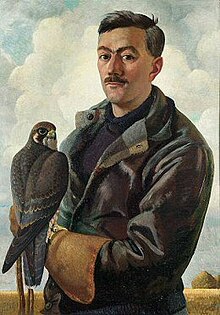Henry Williamson
| Henry Williamson | |
|---|---|

Portrait by Charles Tunnicliffe, c. 1935
|
|
| Born |
1 December 1895 Brockley, London |
| Died | 13 August 1977 (aged 81) Georgeham, Devon |
| Nationality | English |
| Known for | Ruralist books (Tarka the Otter) |
Henry William Williamson (1 December 1895 – 13 August 1977) was an English army officer, naturalist, farmer and ruralist writer known for his natural history and social history novels. He won the Hawthornden Prize for literature in 1928 with his book Tarka the Otter.
Henry Williamson was born in Brockley in south east London. In early childhood his family moved to Ladywell, and he received a grammar school education at Colfe's School. The then semi-rural location provided easy access to the Kent countryside, and he developed a deep love of nature throughout his childhood.
On 22 January 1914, Williamson volunteered as a rifleman with the 5th battalion of the London Regiment ("London Rifle Brigade"), part of the British Army's Territorial Force, and was mobilised when war was declared upon Imperial Germany by the British Empire on 5 August 1914. In November 1914, he departed England with the Regiment's 1st Battalion and went to France, entering the Western Front's trenches in the Ypres Salient, where he witnessed and took part in the Christmas Truce between British and German troops. In January 1915, he was withdrawn from the winter trenches with trench foot and dysentery and evacuated back to England. After convalescence, he was commissioned on 10 April 1915 as a second lieutenant with the 10th (Service) Battalion of the Bedfordshire Regiment. In May 1915, he was attached for training to the 2/1st Cambridgeshire Regiment's at Newmarket. In October 1915, he was transferred to the 25th Middlesex Regiment at Hornchurch. He volunteered to specialise in machine-gun warfare, and consequently, in January 1916, joined No. 208 Machine Gun Company of the Machine Gun Corps at Belton Park, Grantham. In May 1916, he entered hospital in London with anaemia, and was granted two months' medical leave. He rejoined No. 208 MGC and in February 1917 departed England with it for the Western Front, the unit taking the field with the 62nd (2nd West Riding) Division, Williamson acting as his company's transport officer. In June 1917, he was gassed whilst transporting ammunition up to the front line, and was returned to England, spending the next few months in military convalescent hospitals. In September 1917, he was attached for garrison duty as the adjutant of the 3rd Battalion Bedfordshire Regiment at Felixstowe. Medically classed B1 by an Army Medical Board, from the effects of the gas, he was judged to be unfit for active service. After a year at Felixstowe, and frustrated at the nature of garrison life, Williamson attempted to get back to front-line action in September 1918 with an application to be transferred to the Royal Air Force, but this was rejected due to his medical classification. He then applied for a transfer to the Indian Army, which was granted, but the war was ending and the order was cancelled. He spent a year afterwards on administrative duties demobilising soldiers from military camps on the south east coast of England, and was discharged from the army himself on 19 September 1919.
...
Wikipedia
